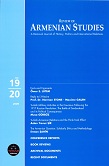Just as in the last nine years, the first article of this issue of our Journal is dedicated again to Facts and Comments which examine the Armenian Question and the foremost developments in the Turkey-Armenia relations within a specific timeframe. The most important event of 2009 concerning Turkey-Armenia relations is the signing of two protocols between the two countries in order to normalize relations. The highly comprehensive Facts and Comments of this issue has only been devoted to this subject. The English texts of the protocols have been given at the end of our Journal in the Recent Documents section.
The Magazine “L’Histoire” published in France has devoted their April 2009 issue to Armenian Genocide allegations and have published interviews conducted with some Turkish scholars for this purpose. The well known historian Prof. Norman Stone and doctoral student Maxime Gauin have written an article criticizing one of these interviews. Since the Magazine “L’Histoire” has refrained from publishing this article, we are doing it under the title Reply to L’Histoire.
In Armenia, each year in May, the Sedarabad “victory” of 1918 towards the Ottoman forces is being celebrated. However, no such defeat is mentioned in the Turkish historical sources which indicate that some fighting took place during the advancement of Ottoman armies towards Baku which has occurred in the region of Serdarabad. Musa Gürbüz, in his article entitled Turkish Military Activities in the Caucasus following the 1917 Russian Revolution: the Battle of Sardarabad and Its Political Consequences, examines this fighting according to the Turkish and Armenian sources.
Recently, the efforts to normalize Turkey-Armenia relations created an increase in the interest for this subject and some think-tanks have convened conferences and written reports relating to this matter. In his article entitled Turkish-Armenian Relations and the Think-Tank Effects, Aslan Yavuz Şir examines some reports and articles published from 2007 onwards concerning this subject, puts forth the recommended policy choices and future speculations, and attempts to answer some questions.
Erman Şahin, in his article entitled The Armenian Question: Scholarly Ethics and Methodology, examines some ethical problems arising from an article published by two Turkish authors relating to the Hrant Dink case.
Two conference reports can be found in this issue of our Journal. The first entitled World Congress of the International Institute of Sociology has been written by Ayşegül Baydar Aydıngün; the second relating to the conference organized by the Political Psychological Association is entitled Turkish-Armenia Relations from Past to Present: An Interdisciplinary Approach and has been written by Aslan Yavuz Şir.
One book review, seven archival documents and three recent documents can be found in this issue of our Journal.
Sincerely,
The Editor
Editorial Note : p.5
ARTICLES
Ömer E. LÜTEM - "Facts and Comments": p.7
Prof. Dr. Norman STONE - Maxime GAUIN - "Reply to L’Histoire" : p. 91
Musa GÜRBÜZ - "Turkish Military Activities in the Caucasus Following the 1917 Russian Revolution: The Battle of Sardarabad and its Political Consequences" : p.107
Aslan Yavuz ŞİR - "Turkish-Armenian Relations and the Think-Tank Effect" : p. 121
Erman Şahin - "The Armenian Question: Scholarly Ethics and Methodology" : p.141
CONFERENCE REPORTS
Assoc. Prof. Dr. Ayşegül BAYDAR AYDINGÜN - "39th World Congress of the International Institute of Sociology" : p. 153
Aslan Yavuz ŞİR - "“Turkey-Armenia Relations From Past to Present: An Interdisciplinary Approach” Organized By the Political Psychological Association" : p.157
BOOK REVIEWS :
Aslan Yavuz ŞİR - "Caucasus after the Cold War" : p. 163
ARCHIVAL DOCUMENTS: p.167
RECENT DOCUMENTS : p. 189
Statement of President Barack Obama on Armenian Remembrance Day, April 24, 2009 : p.198
Turkey-Armenia Protocols : p.199
Ömer E. LÜTEM
Prof. Dr. Norman STONE - Maxime GAUIN
Musa GÜRBÜZ
Aslan Yavuz ŞİR
Erman Şahin
Assoc. Prof. Dr. Ayşegül BAYDAR AYDINGÜN


